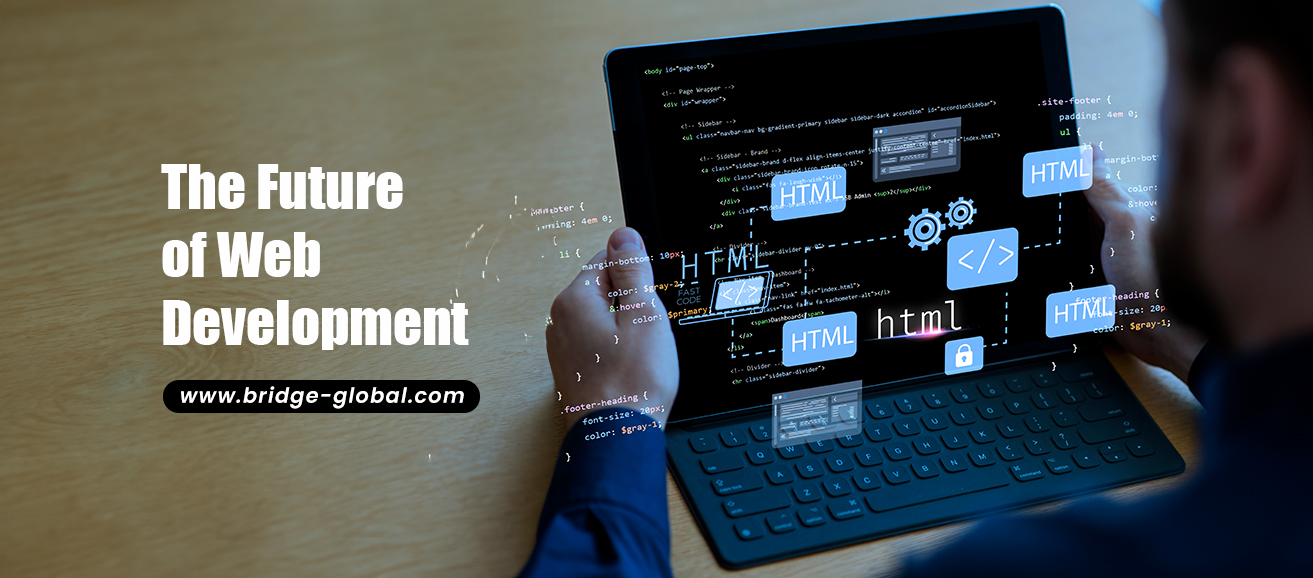The Future of Web Development Trends We’re Watching
The future of web development is unfolding at an unprecedented pace, redefining how businesses build, optimize, and deliver digital experiences. For a software development company, staying ahead of emerging technologies isn’t just about competitive advantage - it’s about survival in a digital-first economy. From the evolution of frontend technologies to the growing influence of AI in web development, the landscape is teeming with innovations that demand attention.
As businesses shift from traditional websites to immersive digital platforms, understanding these transformations becomes critical. Organizations seeking custom website development must now navigate a complex web of frameworks, automation tools, and integration demands, all while ensuring top-tier user experiences and operational scalability.
Let’s dive into the trends we’re closely monitoring that are set to define the future of web development.
Frontend Technologies Are Getting Smarter
The battle for frontend dominance has intensified with frameworks like React, Angular, and Vue.js continually evolving. But the next wave of frontend technologies is about more than just improved libraries - it’s about intelligent interfaces that adapt in real-time to user behavior.
With the integration of AI-driven personalization engines, developers can now create dynamic UIs that modify layouts, suggest content, and optimize user journeys based on real-time analytics. This move towards AI in web development is reducing the friction in digital interactions, making websites smarter and more user-centric.
Progressive Web Apps (PWAs) are another area where web development innovation is thriving. Combining the best of web and mobile experiences, PWAs ensure faster load times, offline access, and seamless responsiveness - all of which are becoming non-negotiable expectations from end-users. For businesses considering custom website development, embracing these advanced frontend frameworks is no longer optional but essential for future readiness.
AI in Web Development: From Hype to Practicality

Artificial Intelligence is no longer a buzzword in the web development ecosystem. The rise of AI in web development is transforming how websites are designed, developed, and maintained. From AI-powered code completion tools that streamline development cycles to chatbots and virtual assistants enhancing customer engagement, AI is ingrained in every phase of the web lifecycle.
One of the most impactful use cases is AI’s ability to automate routine testing and bug detection, significantly accelerating release cycles for any software development company. Additionally, AI-driven analytics platforms help developers understand user behavior patterns more deeply, enabling personalized content delivery that boosts engagement and conversions.
AI is also reshaping accessibility by assisting in the creation of inclusive designs that comply with global accessibility standards. This form of automation ensures that businesses reach wider audiences while minimizing manual errors in coding accessibility features.
The Demand for Custom Website Development
Off-the-shelf website builders no longer suffice for businesses aiming to deliver unique digital experiences. The demand for custom website development is on the rise as brands seek tailored solutions that align with their unique business models and customer expectations.
A software development company focusing on custom solutions can build platforms that are not only scalable but also seamlessly integrate with existing enterprise ecosystems - from CRM systems to AI-driven analytics dashboards. This level of customization enhances operational efficiency and paves the way for innovation, giving businesses a significant edge over competitors relying on generic platforms.
Additionally, as web applications grow more complex, there’s an increasing need for backend architectures that can handle high traffic volumes, ensure robust security, and deliver superior performance. This has led to a surge in adopting headless CMS solutions and microservices architectures, which decouple frontend presentation layers from backend systems, enabling greater flexibility in development and content delivery.
Web Development Innovation: The Era of Automation & Low-Code

One of the most noticeable shifts in the future of web development is the adoption of automation and low-code/no-code platforms. These tools are empowering businesses to accelerate development cycles without compromising on quality.
Low-code platforms, bolstered by AI-driven components, allow non-technical users to build and deploy functional websites with minimal coding knowledge. However, for complex and enterprise-grade applications, the expertise of a software development company remains crucial to ensure scalability, security, and seamless integration with business-critical systems.
Automation is also streamlining workflows in testing, deployment, and CI/CD pipelines. Automated deployment tools are enabling faster rollouts with minimal downtime, while AI-powered testing frameworks ensure that bugs are caught early in the development process, reducing costs and time-to-market.
Enhanced Focus on Web Performance & User Experience
In an age where attention spans are shrinking, website performance has become a critical differentiator. Google’s Core Web Vitals have already set new benchmarks for website speed, interactivity, and visual stability. Businesses that fail to meet these metrics risk losing search rankings and, consequently, potential customers.
As a result, the future of web development will see a heightened emphasis on performance optimization techniques like lazy loading, code splitting, and server-side rendering. These approaches ensure that users receive a smooth and responsive experience, regardless of their device or network condition.
Moreover, personalized and immersive user experiences powered by AI are driving the adoption of technologies like Augmented Reality (AR) and Virtual Reality (VR) in web interfaces. These innovations, although still in their early stages, are redefining how businesses engage with their audiences online.
Security and Compliance: Non-Negotiables in Web Development

With cyber threats becoming increasingly sophisticated, robust security measures are no longer optional in the development process. Data privacy regulations, such as GDPR and CCPA, have made it imperative for businesses to adopt secure coding practices right from the initial stages of web development.
For a software development company, ensuring compliance through secure development frameworks and continuous security testing is a top priority. Incorporating secure DevOps (DevSecOps) practices is now a standard requirement, as it ensures that security is integrated throughout the software development lifecycle rather than as an afterthought.
The Role of Business Intelligence in Web Development
Data-driven decision-making is becoming the backbone of modern web strategies. Businesses are now embedding business intelligence services into their digital platforms to gain real-time insights into user behaviors, content performance, and conversion metrics.
By integrating advanced analytics dashboards, businesses can make informed decisions that optimize their web strategies and improve ROI. These business intelligence services not only enhance user experiences but also provide valuable foresight into emerging market trends and customer preferences, ensuring businesses stay agile in a competitive landscape.
Conclusion: Preparing for the Future of Web Development
The future of web development is being shaped by a confluence of technological advancements, changing user expectations, and evolving business demands. From intelligent frontend technologies and AI in web development to robust custom website development practices and data-driven strategies, the journey ahead promises both challenges and opportunities.
For businesses aiming to build future-proof digital platforms, partnering with an experienced software development company becomes imperative. Such collaborations ensure that your digital assets are not only innovative and scalable but also aligned with emerging technologies and compliance standards.
As web development continues to evolve, staying informed and adaptable will be the key to leveraging these trends effectively. The organizations that embrace continuous learning and invest in forward-looking strategies will be the ones to lead in this ever-changing digital era.



